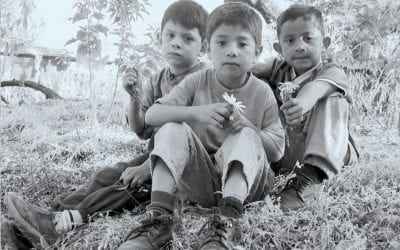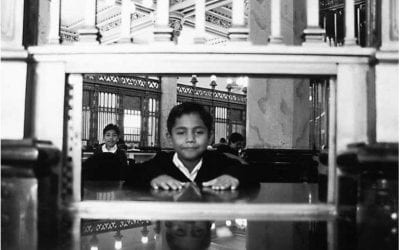A Review of Irregular Armed Forces and their Role in Politics and State Formation
States by Force

Irregular Armed Forces and their Role in Politics and State Formation Edited by Diane E. Davis and Anthony W. Pereira Cambridge University Press, 2003, 419 pages.
As I sat in heavy traffic in the back of a police car during rush hour in the grimy northern zone of Rio de Janeiro, I studied the faces of drivers in neighboring cars, wondering what they thought of the machine guns pointed outwards by two of the policemen I was traveling with. In scores of interviews conducted as part of my research on police and state reform in Brazil, police officers had asserted that the role of the police was to “defend the state’s monopoly over the legitimate use of force.” Visible displays of force were one way of sending this message. Having visited some of Rio’s meanest favelas, where drug traffickers in military fatigues toted automatic weapons, I could not help but wonder whether it was a question of defending a fading monopoly or establishing one in the first place.
The construction of the Weberian ideal of the state’s monopoly over the legitimate use of force is an idea central to the new book, Irregular Armed Forces and their Role in Politics and State Formation edited by Diane E. Davis and Anthony W. Pereira. Literature deriving from the Western European experience of state formation has tended to see external wars and traditional armies as main points of departure. Davis and Pereira, through the 13 case studies of this illuminating volume, seek to more accurately reflect the historical and indeed contemporary importance of “irregular” armed forces—paramilitary groups, personal militias, mercenaries, guerillas and warlords—to an understanding of the origins and preservation of state authority and legitimacy.
Charles Tilly, a renowned scholar of state formation, sets the stage for the case studies by providing a survey of the Western European experience since 1650. Princeton sociologist Miguel Angel Centeno then traces the very different Latin American experience. He argues that Latin America stands in stark contrast to the “total wars” of Western Europe, in which weak states vanished, because the Latin American historical experience with external war has been, by and large, confined to “limited wars.” Following from Tilly, Centeno argues that in Europe, total wars, despite the massive death and destruction they caused, ultimately served as a socializing and state-building experience. They forced the state to increase extraction of resources for the war effort and to prioritize national needs over regional identities and loyalties, while mobilizing the population in the process. By means of an overview of Latin America’s experience with external war, he highlights the fact that in the region traditional enemies have been “internal—the poor, the Indian, the black” noting that from the perspective of national leaderships, “to arm the populace to fight a different national elite with whom one shared ideological, culture, and economic interests was sheer insanity.” The historical struggle to fight such internal enemies, he concludes, has fomented perpetual division rather than the greater cohesion that resulted from the Western European experience of defending the nation against external aggressors.
The destructive consequences of prolonged internal armed conflicts are readily observed in Mauricio Romero’s essay on paramilitary groups in Colombia. He depicts a central state that is in control neither of its territory, nor of its security forces. The web of violence used by a multiplicity of guerrilla groups, paramilitary organizations, rogue elements in the armed forces, landowners, self-defense leagues, and drug traffickers, calls into question the relevance of the state and its laws as a means of adjudicating disputes among the population or as a means of patterning behavior. Exacerbating the situation, Romero argues, have been recent efforts at political decentralization in Colombia. While aimed at strengthening municipal governments to speed the democratic transition and liberalized economy, they have in fact contributed to further disintegration of the state and widespread use of violence to secure the fruits of electoral competition.
A historical essay by Laura Kalmanowiecki focuses on Argentina’s efforts over the period 1888-1945 to further consolidate central state power. By establishing a federal police force with wide powers and jurisdiction in all provinces, successive governments sought to weaken and control regional interests, worker organizations, anarchist groups and other social movements that might challenge the supremacy of the federal government. The struggles and tensions between central state and subnational authorities are also evident in Lizabeth Zack’s essay on the municipal police in France, which depicts the many false starts and reversals of efforts to centralize the means of coercion.
Like Zack’s essay, the remaining chapters of the book, while not directly related to Latin America, speak to the problems of the region. Several contributors look at the problems surrounding demobilization of troops and their political impact on post-conflict reconstruction in contexts as different as Japan, Greece, and the United States. William Reno’s essay on tribalism and warlordism in West Africa, in particular, vividly illustrates how leaders have tried to promote disorganization and deinstitutionalization at all levels, using vast personal security apparatuses as a means to hold onto patronage networks rather than as a means of providing any form of public security. The case studies conclude with a probing discussion by Ian Roxborough of post-Vietnam civil-military relations in the United States together with an analysis of the new challenges to external war making and domestic security in the context of a “global war on terrorism.”
Notwithstanding the breadth of the subjects touched upon in the book, perhaps missing from the analysis is a case study focused on the threats to the modern state emanating from criminal elements, both local and transnational. The chapters in the volume also do not directly address the issue of the construction of a democratic regime. Nevertheless, the question of whether or not democratization is possible in the absence of a strong state capable of marshalling material and symbolic resources for a common project and of providing protection to its citizenry, are themes implicit throughout many of the chapters. As Anthony Pereira notes in the conclusion, coercion and violence are likely to “remain an intrinsic, important, and unavoidable aspect of human affairs.” Indeed, works such as this edited volume that offer new perspectives on armed conflict and use of force among and within nations, by traditional and irregular security forces, are important intellectual contributions to an understanding of politics, democratic or otherwise.
Winter 2004, Volume III, Number 2
Mercedes Soledad Hinton is a Postdoctoral Research Fellow, in the Department of Law of the London School of Economics and Political Science (LSE). A graduate of Harvard College (’98), she received her doctorate in Political Science from the University of Cambridge in 2003.
Related Articles
Through the Eyes of Children
Twenty years ago, I put my camera away, suspending a photographic career I’d happily pursued for nearly a decade. I did this after publishing photos I’d taken in a Salvadoran war zone in 1983…
Teen Life
Teen Life In Latin America and the CaribbeanWhat is life like for teens in Latin America and the Caribbean? That's a question I set out to answer when I was approached by Greenwood Press to co-edit Teen Life in Latin America and the Caribbean, with Kristen Sternberg...
Reconfiguring Childhood
Children are a spur, a commitment, a way of imagining the future—but all too often these sorts of phrases just rattle around a vacuum, their utterance the beginning and end of the…




